In the vast solitude of the Pacific Northwest, a transformative journey unfolded—one that stretched along 1,700 kilometers of coastline and weaved through the 50,000 islands between Vancouver Island and Alaska. The intrepid soul behind this odyssey was then-24-year-old geography student David Norwell. For him it wasn’t just a kayak expedition; it was a solo intervention and an exploration of self, nature and privilege.
This particular trek of the PNW is considered a testing ground for sea kayakers due to its geographical complexity. The maze of jagged mainland and islands can be difficult to navigate, and the deep fjords offer little space for shore access. This makes it inaccessible to many, and much of it goes unseen.
Inspired to share such an ill-known area that sees more bears, wolves and whales than people, Norwell documented his journey in a new illustrated memoir, A Complex Coast: A Kayak Journey from Vancouver Island to Alaska.

Released in May 2023, the book brings the PNW to life with playful watercolor images. It fuses art and science with a careful orchestration of words and images of maps, local flora, wildlife and landscapes, allowing readers to visually traverse the rugged terrains and intricate ecosystems, and learn about the resilient cultures that call this region home.
Norwell was named a finalist for A Complex Coast in the Adventure Travel category of this year's Banff Mountain Book Competition, celebrated during the festival from Oct. 29 to Nov. 6. The competition specifically honors non-fiction books centered around travel to and exploration of remote landscapes, along with the cultures intertwined with them.
In a recent interview with Kinute, Norwell discusses the inspirations that led up to the voyage, the heart of the adventure, the creative process behind the book, and a crucial question we all should be asking ourselves.

Norwell working on the images for A Complex Coast. Photo by Wasarin
What inspired you to embark on this 1,700-kilometer kayak journey from Vancouver Island to Alaska and how did it lead to the creation of A Complex Coast?
A Complex Coast is the book I wish I had when I was 17.
I was numb before this trip and writing this book. When I was 24, I felt my university experience was not applicable to the outside world, or even my personal well-being. I was also addicted to online pornography, and generally depressed about how humanity was blendering forests, fish and mountains.
I needed an intervention and a new perspective.

Jimmy Rig Kayak Sailing by David Norwell
I had previous kayaking experience, having paddled through the Gulf Islands and leading youth groups on shorter trips, but this adventure was different—the vastness of the Pacific, the solitude, the maze of 50,000 islands.
Maybe I could heal.
During the trip I kept a journal—those books are mangled now, like captain logs with tea-stained pages. So the finished book is a revamp of those original journals.
More than anything, the Pacific Northwest is extremely tricky to access, and many people will never see it, especially not from a kayak point of view, so this book is a way for people to visit the Great Bear Rainforest without leaving their home.
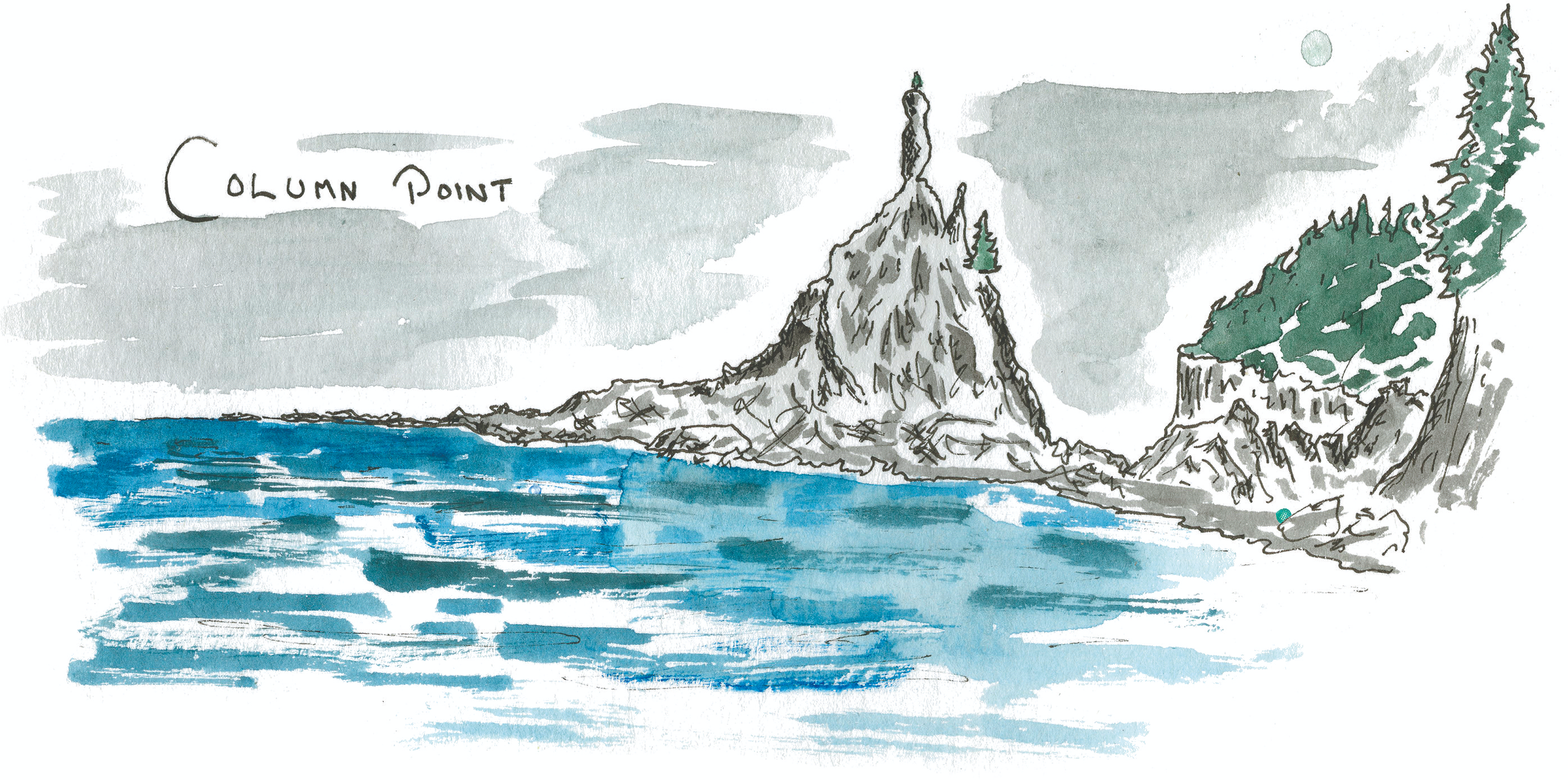
The illustrations in your book are described as whimsical watercolor maps and illustrations. How did your background as an illustrator influence your storytelling in this memoir?
I don’t really have a background in illustration. Hehe. I mean, I just draw things when words don’t work to describe them.
I love making maps the most. Tracing miles of coastline onto a sheet of paper is therapeutic, and one of the best things a person can do to get connected to a landscape. Then you kayak along those edges, marking observations, noting campsites, sea lettuce, and where you cried for an hour, for no reason. I think painting, in nature, can change a person’s life.
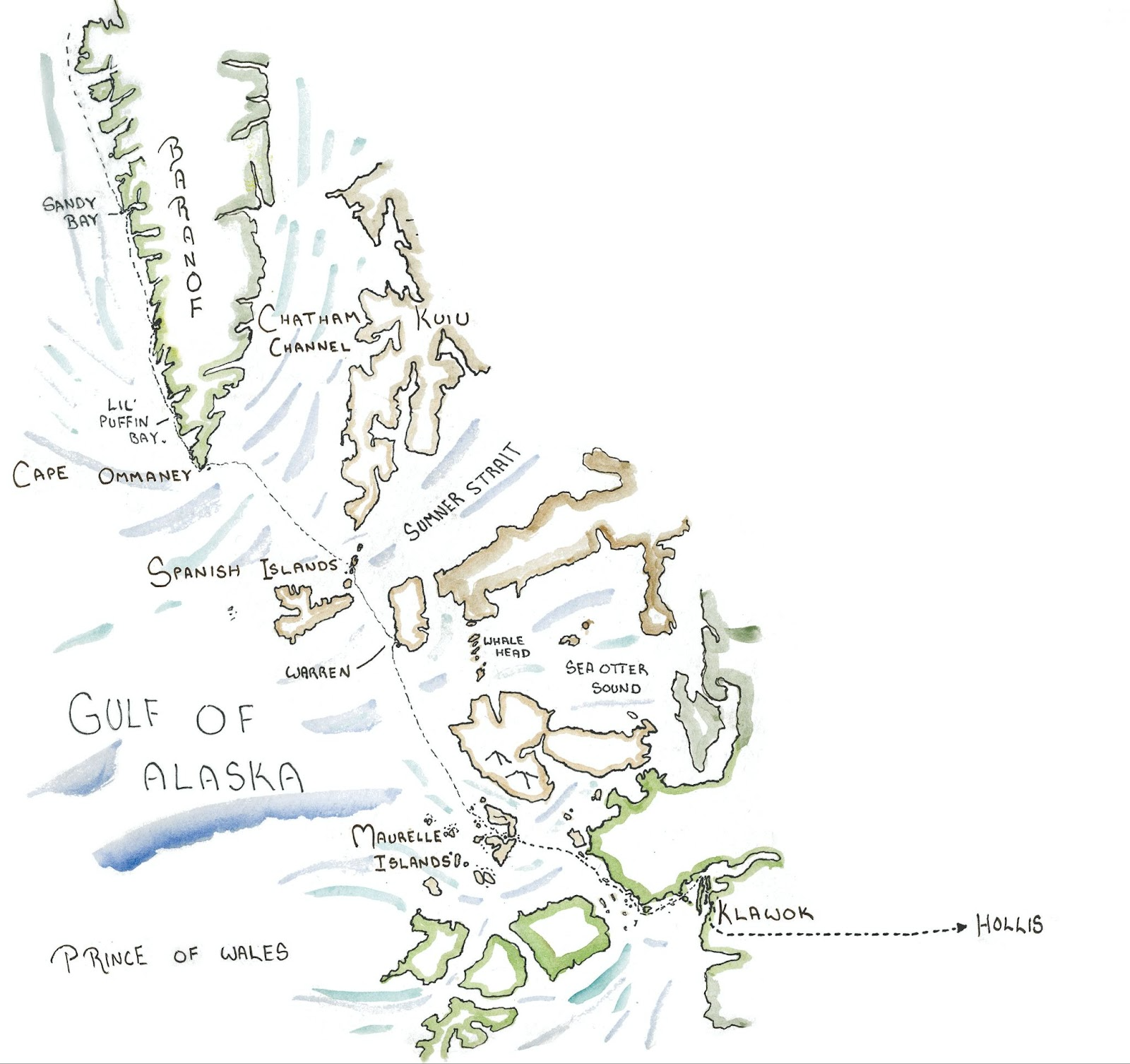
Cape Decision Chart by David Norwell
Could you share one or two memorable moments from your journey that had a significant impact on you?
Well, I flipped a lot—more than a normal person kayaking. But that was because I jimmy-rigged an 8-foot cedar A-frame mast with a tarp sail. I sailed Bell Pepper (the kayak has a name) about 30% of the trip. The worst flip was from Oona River to Prince Rupert. It was pouring, and a 20-knot gust knocked my sail hard, and slowly I submerged.
Imagine a 48-square-foot tarp filled with water with lines attached to your paddle. And you’re upside down, underwater. Also, the Pacific Ocean in May is 10 degrees Celsius. After pulling the skirt (wet exit), cutting all the lines, all while getting pummeled by waves, I began to attempt to re-enter the kayak. On flat water, this is a quick operation. But I was cold, tired, hungry, scared and fumbling. I’m wearing a 5-millimeter wetsuit, but it has plenty of holes.
Eventually I squirmed into the bathtub (cockpit), pumped out the water, and paddled to shore, which is a seagull island, with wet wood. My hatches leaked and everything was salt watered.
I couldn’t light a fire, so I set up the tent, got in my moist sleeping bag, and started shivering. Evolution takes over. I do temperature equations: I’m in my last dry clothes, and getting out of the tent means getting more wet. I’m shivering, and not sure if I will get past the threshold where the body can warm itself.
Two hours later, I was still shivering and finally getting some feeling back. The next day, weird blisters had formed on my toes.
It woke me up—I could really get mangled out here. And sea lions and wolves would be the first to find me. That’s pretty special. To feel small and vulnerable to the indifferent and powerful Pacific Ocean.
Second story: A humpback almost breached on top of me. There is a comic of it in the book.
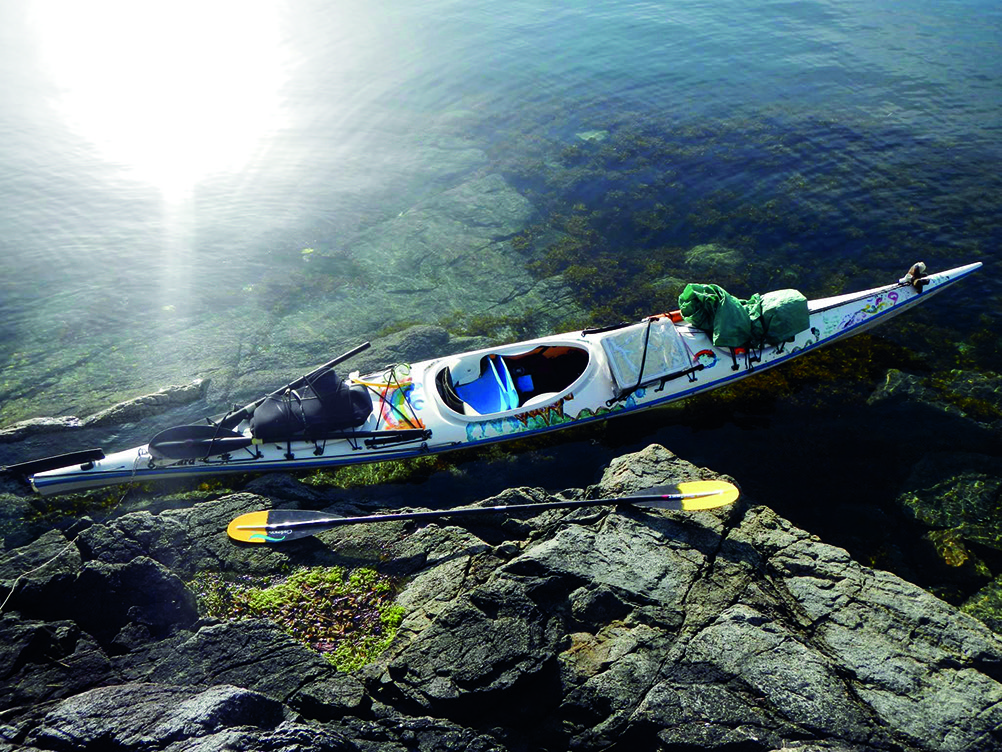
Norwell's kayak, Bell Pepper. Photo by David Norwell
Your book delves into themes of solitude, meaning, adventure and privilege. How did your personal reflections and observations during the journey shape the narrative of your book, and what message do you hope readers take away from these reflections?
Hmm. A white guy kayaking up the coast and “finding himself” is a pretty colonial narrative. I mean, I was (still am) just this ignorant, privileged kid from a functional family. The reason I could do this trip was because I have benefited ten-fold from the system that serves my demographic the most.
The thing is, I was never truly alone up there. My search for solitude was bunk from the beginning. The Indigenous Peoples throughout the PNW were always present, and if I ever needed help (calling on the VHF radio), it would be them arriving first on the scene.
I was pretty humbled, and at the same time, ashamed. Every collapsed cannery, 14-story cruise ship, and clear-cut I saw while paddling north was a reminder that my ancestors were greedy urchins (ultimately killing the sea otters, taking the old growth cedars, and exploiting anything they could market). What’s next? The salmon? Our own brains? Humans are so illogical sometimes, it makes me implode. Hehe.
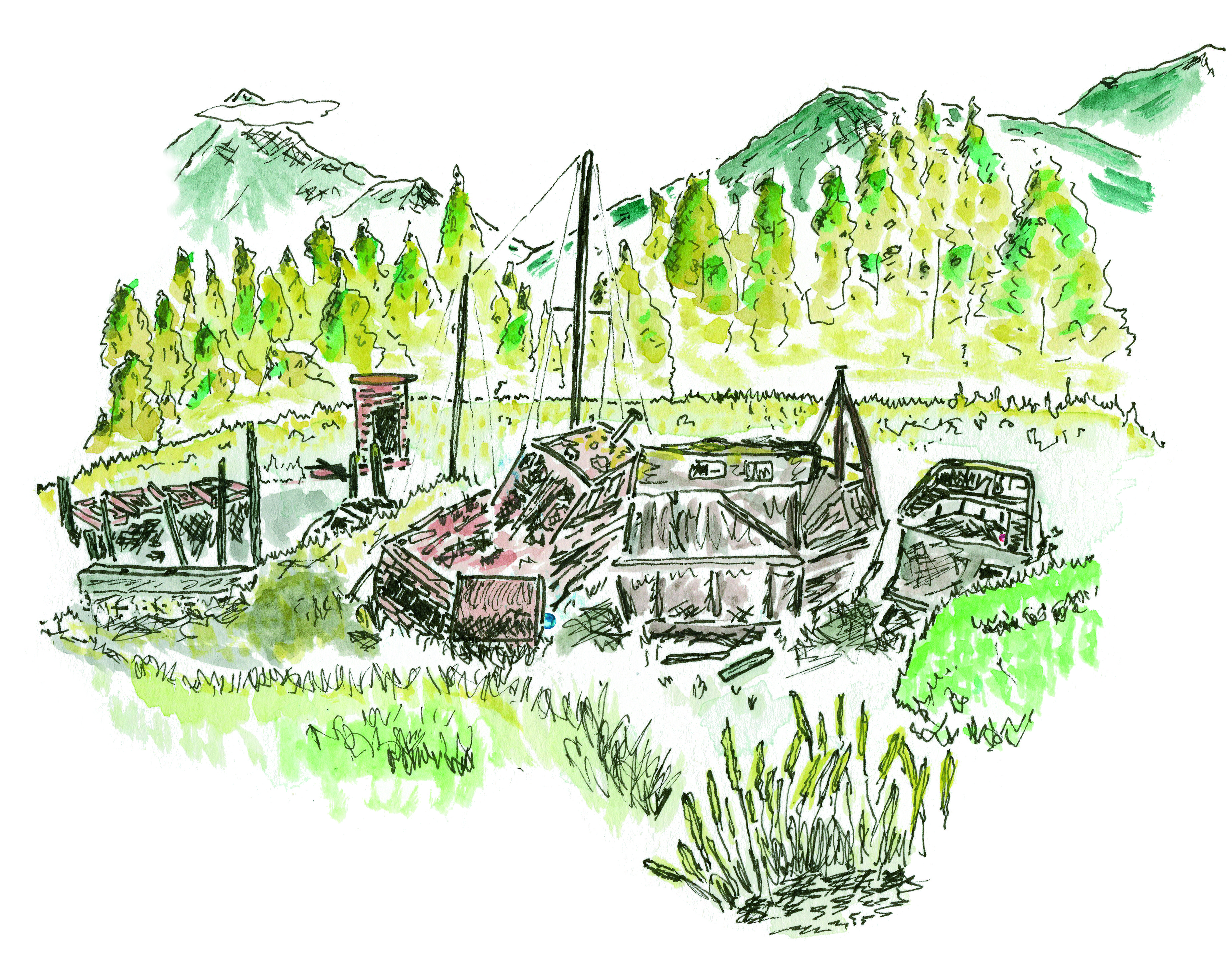 Gustavus Wrecks by David Norwell
Gustavus Wrecks by David Norwell
The reason the trip was transformative, was because it didn’t heal me; I was still struggling with my addictions when I got home, my mind was still this fantasy-machine, and I was still an ignorant, privileged guy swimming in the same ocean I left.
So, writing the book was an exploration of how nature-journeys work, and how they don’t.
I don’t really have conclusions concerning solitude, adventure and privilege. But one thing has come to the surface: mental health matters most. We are creatures of habit and hormones, and our minds often have amazing stories that motivate us toward dubious (and self-serving) ends. So, I think we have to question ourselves: Am I benefiting myself in a deep-down meaningful way, and is it benefiting others similarly. Also: are my actions hurting myself or others?
The Banff Mountain Book Competition focuses on travel to remote and rugged landscapes. How do you think your book contributes to the understanding of such landscapes and their cultures?
Life is different north of Vancouver Island. The Indigenous Peoples, fishermen, homesteaders and sailors who call these islands home are humble, wise and mind-bendingly practical. They were honest in a way that made me … self-conscious. And I realized one thing: these people don’t just live here, they are a part of the ecosystem. Functional members of the food web as well as caretakers of the landscape. This book tells a couple of their stories.
Most people will never get a chance to visit their world.
If you look at satellite imagery, the PNW (which I define as Puget Sound to Glacier Bay) is a maze—50,000 islands threaded with glaciers and jagged peaks. The fjords are ruthless; the Pacific is endless. There are no roads that access the coast save Prince Rupert, Bella Coola and Skagway. It’s hard to get there, it’s hard to get out. This means the culture has diverged from mainstream society; it has developed in ways needed to survive. It was an honor to kayak through a sliver of this area, and what I learned along the way is my ultimate inheritance from planet earth.
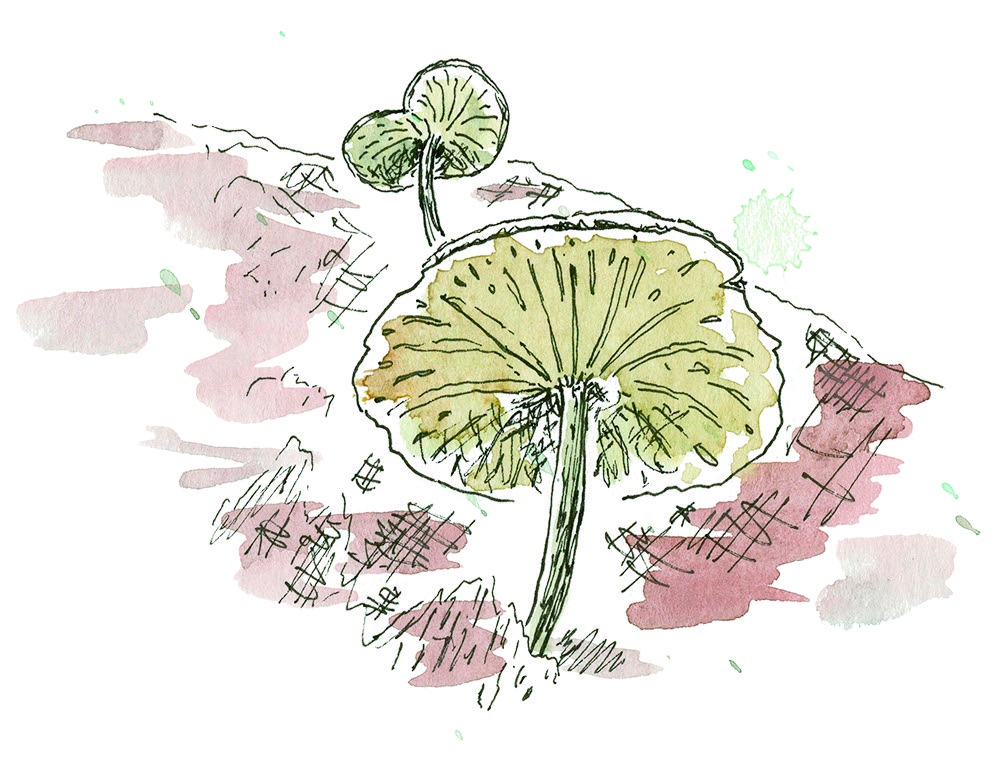 Mushroom Log by David Norwell
Mushroom Log by David Norwell
You have an extensive background in conducting biological and geological surveys. How did your scientific knowledge enhance your experience during the journey?
Science is a pretty good language to understand ecosystems and landscapes. So yes, it helped me build relationships with species, understand weather, and hypothesize where good bays to land were. But it also hindered my ability to understand myself, my mind and aspects of the landscape where science has no words.
I was always thinking while out there, surrounded by orcas, I would be consumed: “wow this is so cool, orcas cerebral cortex’s have double the neural connections than humans, I wonder what their family structure is like? I wonder how they pass knowledge through generations …” and onwards.
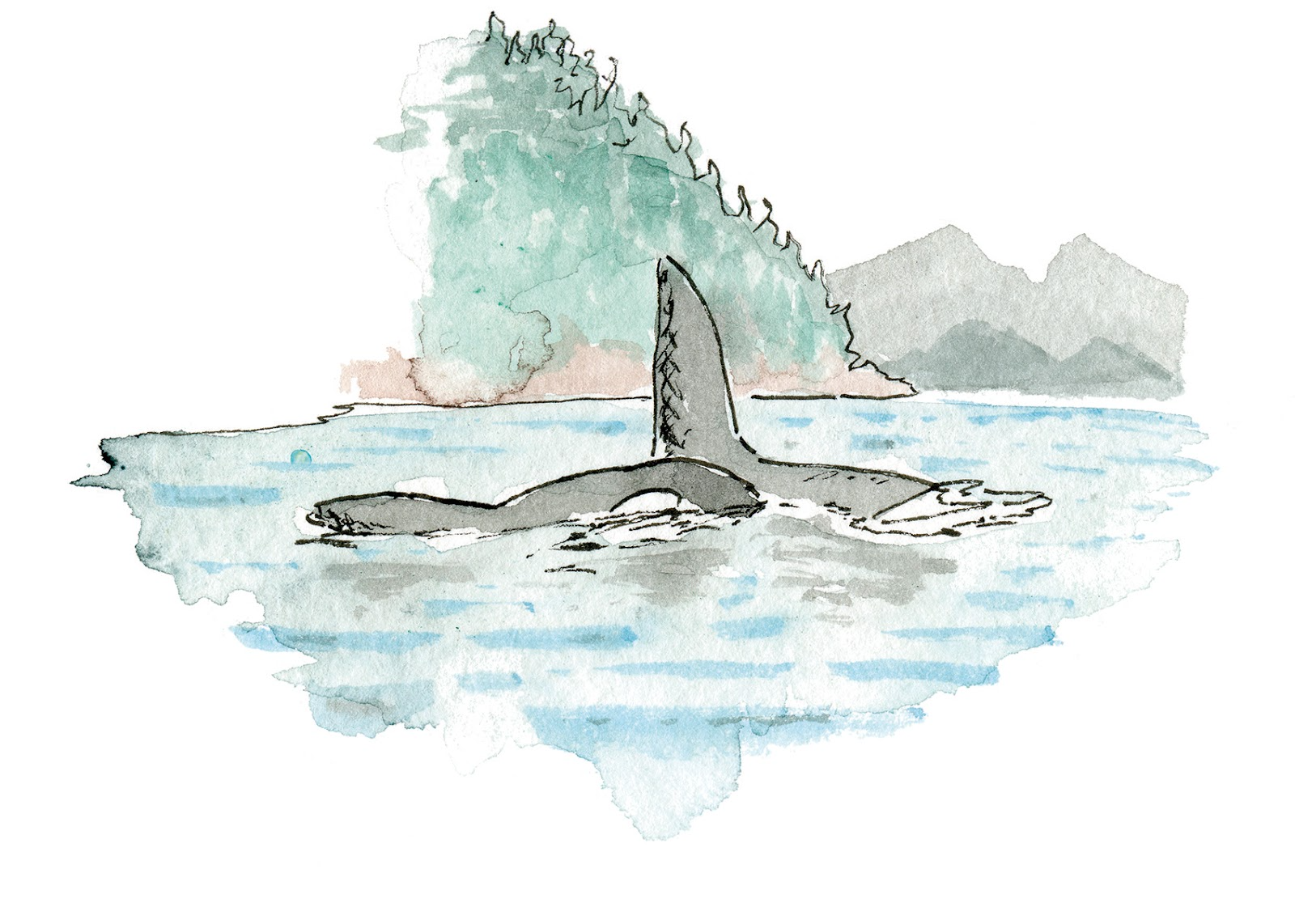
Orca Fin by David Norwell
But mostly I just thought stupid things and replayed my love life over and over. When you’re kayaking alone for months, is it important to know the Latin for all the seaweeds?
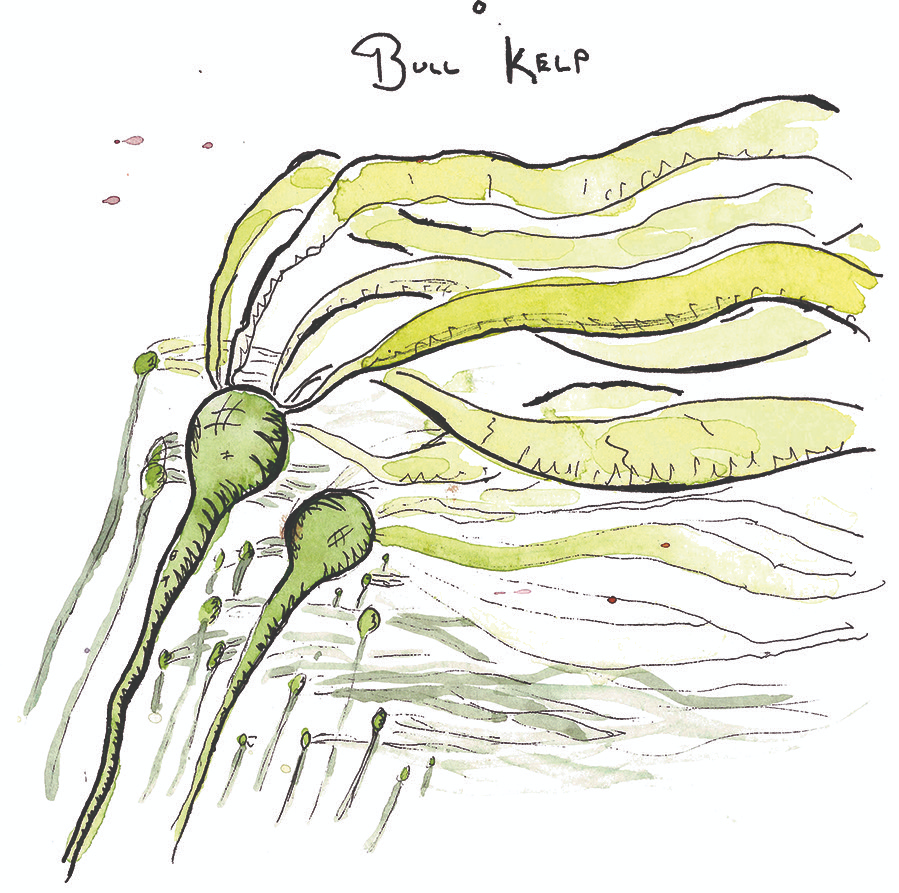
Bull Kelp by David Norwell
Or perhaps, for a moment, it might be better to let things introduce themselves on their own terms.
Science is really great, but it becomes a lens that limits other ways to see the world.
We go around with these big clunky things called ideas, beliefs and theories. And we put so much bread and butter into them we forget to question where they came from. At some point we all have to ask: does this worldview really serve me and my community?
Universities are a constrained and controlled environment. Four walls. Teacher up front. But they fail us when we get into these eco-cultural systems that are incredibly massive and chaotic, with mind-numbing feedback cycles. At the best, science is an approximation of reality, and usually it misses pretty important factors, fails to get beyond the ivory tower, and/or is trumped by political/societal greed.
The whole point of this book is that science needs art, and is doomed without it. Hehe. Well, that’s not the whole point.
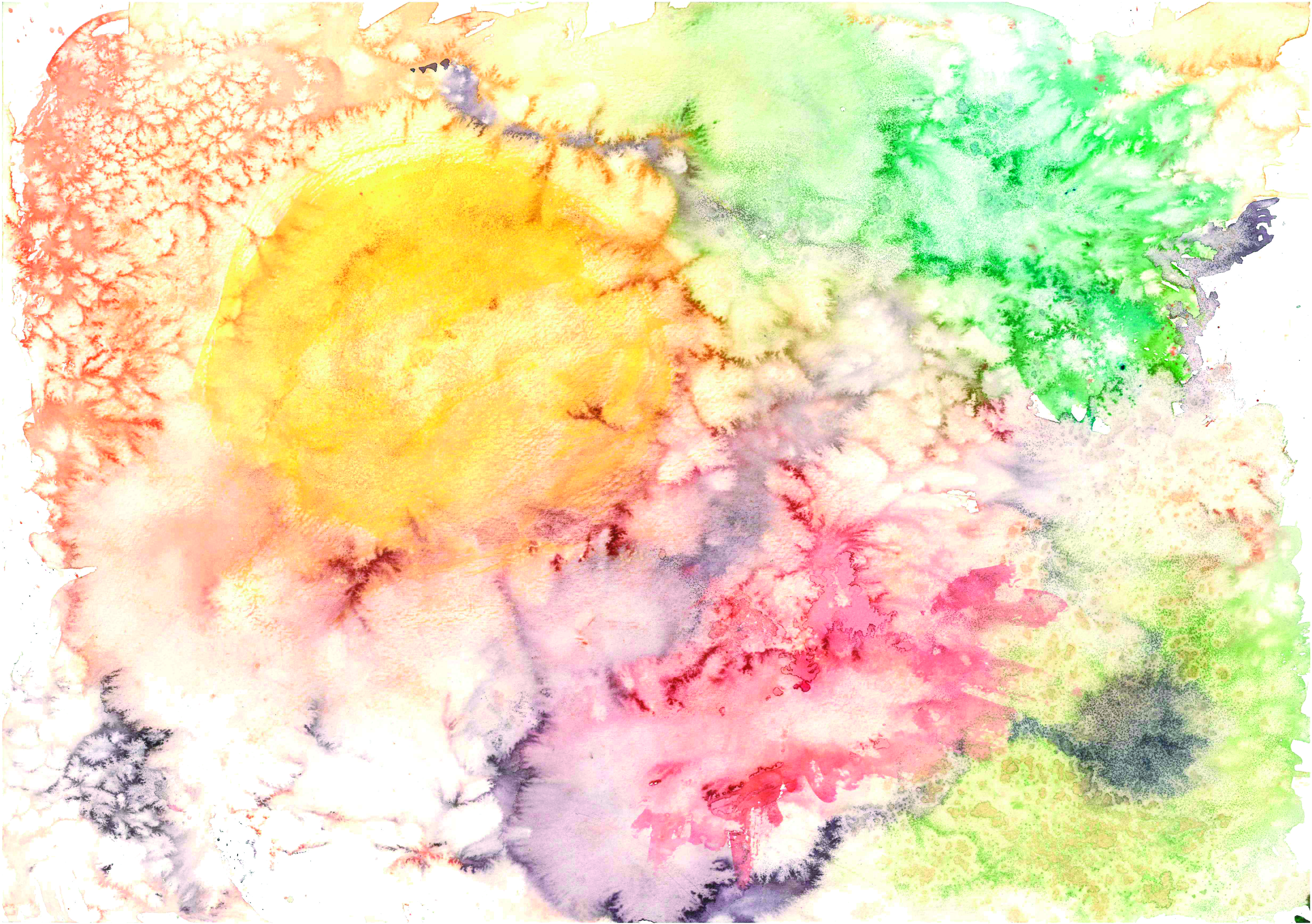
Red Paint and Salt Cosmos by David Norwell
The book is described as a coming-of-age story. In what ways do you think this journey helped you grow, and how did it influence your perspective on life and adventure?
Our society is super mangled right now. In Western culture we grow up with no formal coming of age process—phones at age 12, cars at 16, booze at 18, messy sexual encounters through university, two cars, two kids, two houses, too much.
For me, I didn’t know what I was looking for, but I knew I needed something. This trip was my coming-of-age journey, but it was just the beginning of many. I mean, we are always coming of age, even now at 33, I am still deconstructing old beliefs and establishing new ones.
But I do believe we need more opportunities to grow and be independent … and to make mistakes. The reason this trip was helpful was because I failed a lot, and had to make it right by myself, or ask for help.
So, I learned making mistakes is good, because they make me human.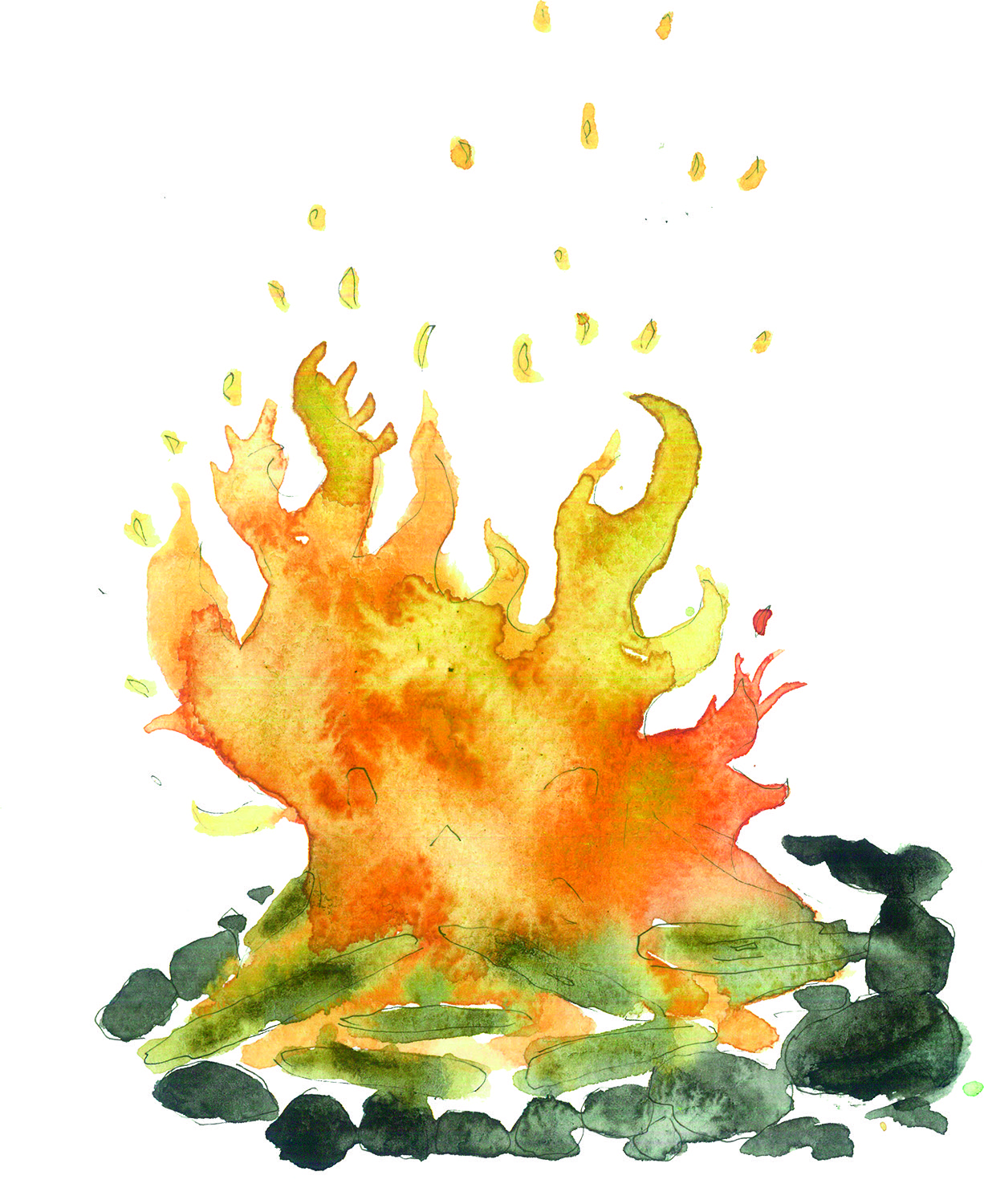
Campfire by David Norwell
How do you balance the scientific aspects of your experiences with the emotional and personal aspects when writing your books?
More and more, I am prioritizing mental health. I think we need techniques and interventions that aim to understand mind and matter from the inside (subjective), as well as outside (objective—the scientific paradigm).
While doing solo expeditions, I realized just how unbalanced my mind is. It’s scary. My emotions respond like exponential growth patterns, and often consume me.
Science gives a vocabulary to better understand emotions and mental processes. And eastern philosophy (especially Buddhism) has given me tools to go deeper into the human experience. So, I really like playing on the edge of science and spirituality. I think there is a lot to learn there. Because we are not just food-sex-survival robots … there is something special about being human, and science can be both an aid and barrier to experiencing it.
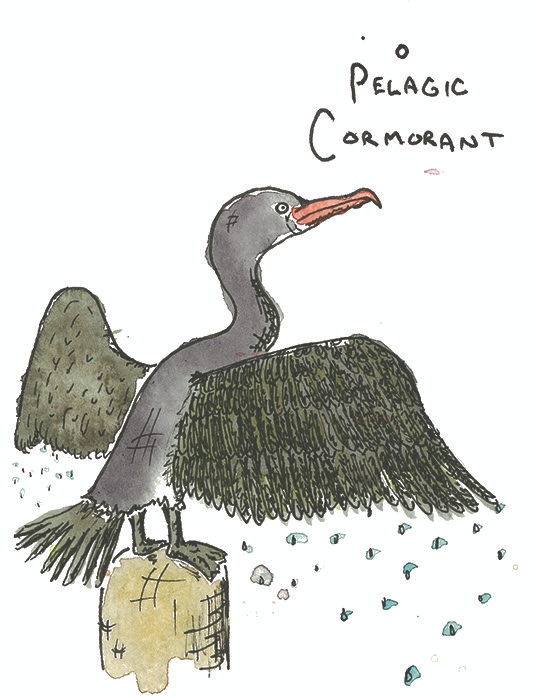 Pelagic Cormorant by David Norwell
Pelagic Cormorant by David Norwell
Could you share a bit about your creative process? How did you decide on the illustrations and their placement within the book, and how do you believe they enhance the readers' experience?
The placement of an image and how to merge it with text is a beautiful thing. People are so short on attention these days—to implant an idea or story into someone’s brain needs a strategy. Sometimes you only get one chance—a single flip of the page at the BC Ferries book shop.
I test my work a lot on other people. Especially pages laid out with text and images together—does this work? What do you look at first? What emotions does this make you feel? What was the main point of this page? I think testing material is the key. For this book, I wanted each page to stand alone and have its own emotional flavor. So you could flip to any page, read it, and be impacted.
I also spent a long time developing fonts. The figure titles and the quotations in the book are my own fonts. It’s a tricky business of letter-ratios. I like the idea of authors using their own self-created fonts.
To be honest I wanted the whole book in these wacky fonts, luckily my publisher opted for something more accessible for the main body of text.
Also, cats … they help the creative process.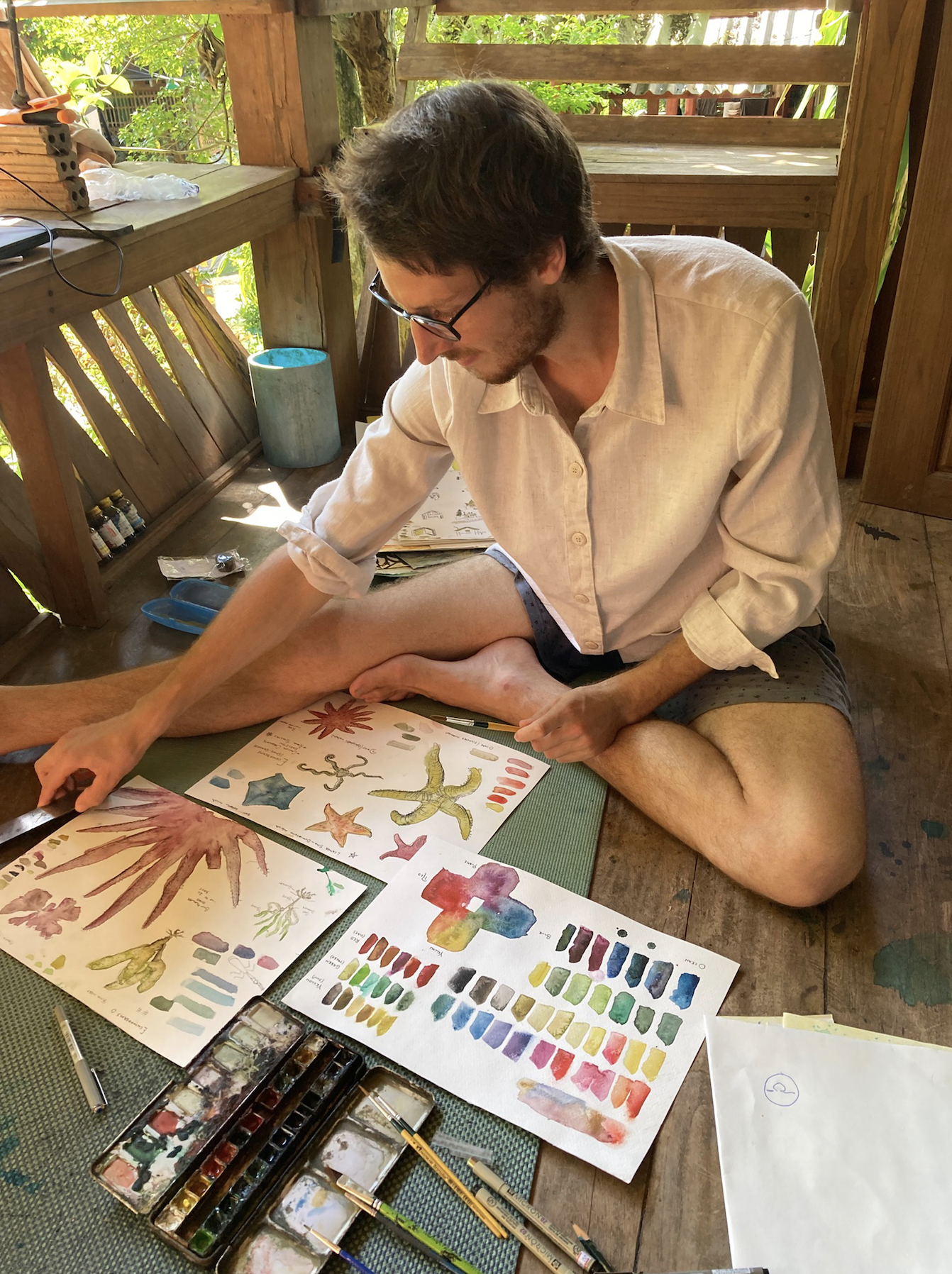
Norwell painting Echinoderms. Photo by Wasarin
What's next? Do you have any new projects in the works?
I will do a TEDx talk in Surrey this January about kayaking, addiction and mental health. I’d like to do more kids books. But mostly I just want to spend time with my family.
It would be cool to do a book about hitchhiking, train hopping and sailboat crewing.
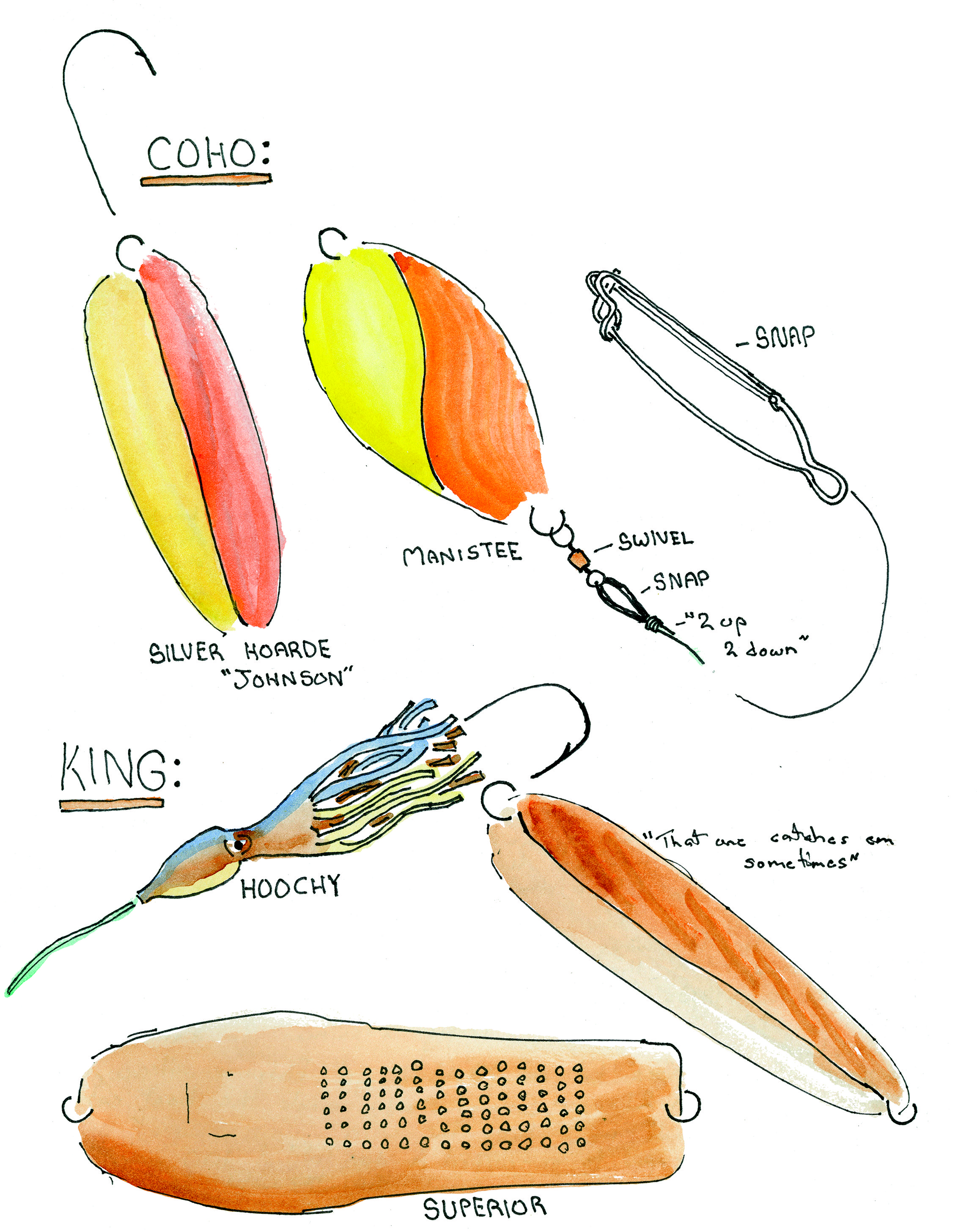
Fishing Lures by David Norwell
Anything else you would like to share?
A Complex Coast is not normal. It’s got eye-spys, a crossword, a maze, a recipe for tidepool soup, and lots of other bonkers stuff. It’s fun (my mom says), and I hope people enjoy it. I said a lot of heavy and heady things above, and to be honest, that’s not what the book is only about at all. It’s about learning to love yourself, and how lucky we are to be alive. I mean, the universe is this super massive thing, and we are here … against all odds.
Also, this book was never mine to begin with. So many people, animals, and places are responsible for its coming together. I guess everything and everyone is kinda like that.
And thank you Kinute! Keep promoting literacy and adventure and everything else that matters most.
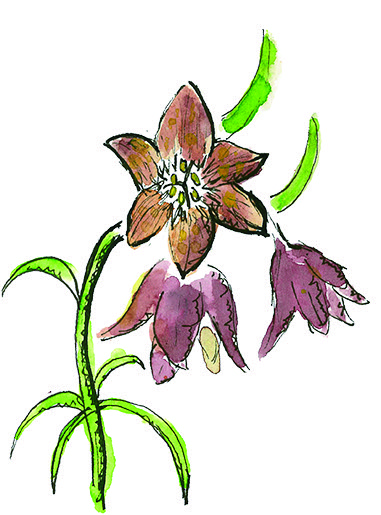
Black Lily by David Norwell
